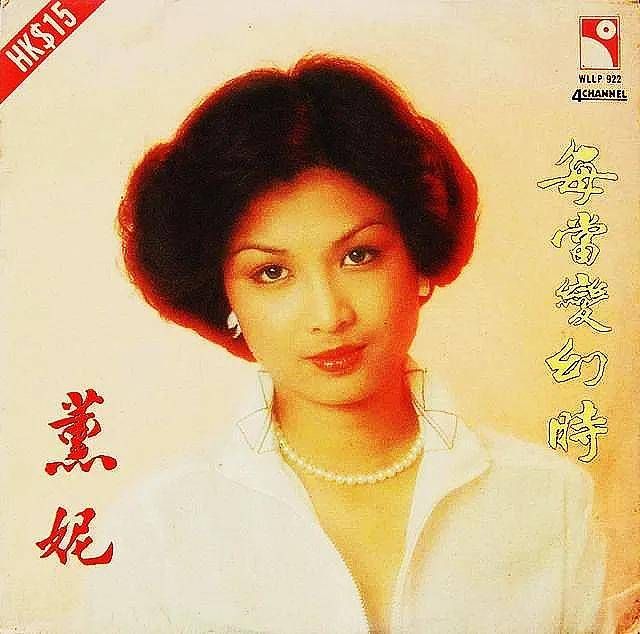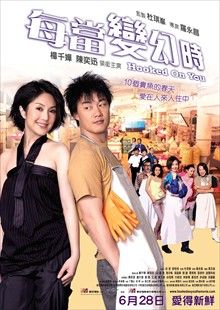Kaoru: Whenever Changes (1977)

- Song: Whenever Changes
- Singer: Kaoru
- Composer: Koga Masao
- Lyricist: Lu Guozhan
- Composer: Lu Yao
- Album: Whenever Changes / Drifting Dreams
- Year: 1977
- Record Label: Eternal
- Preface: 1
- Pop Chart: Chinese Song Dragon Tiger Chart Champion
- Awards: Top 10 Chinese Golden Songs / 20 True Classics
"Whenever Changes" was included in Xun Ni's first compilation album "Whenever Changes / Drifting Dreams" with Feng Weitang in 1977. It is a Japanese adaptation of a song written by Lu Guozhan and is an episode of the movie "Informer".
"Whenever Changes" Composer: Koga Masao|Lyrics: Lu Guozhan|Arrangement: Lu Yao’s reminiscences of the past are intoxicated, half happy, half tearful. Dreams are like happiness in life, forever remembering sadness and deep marrow. When things change, you will know the time to cherish the memory of the past. I used to be intoxicated, thinking of the old things, laughter, tears on my face, dreams like life. I wonder who could have guessed that a stone would turn into an emerald like a couple. You and I have the heart to follow. When it turns into a sunset, you know the time will pass, like a couple, you and I will follow
Xunni's real name is Wang Xunni, and her English name is Fanny. She is a Hong Kong female singer and actress, mainly active in the Hong Kong music scene from the 1970s to the 1980s. "Whenever it Changes" is a song she made when she debuted, and it is also her famous work. Xun Ni's other representative works include "Rain in Hometown", "Fourteen Years Old (Dream)" and "Children, Don't Be Sad" and so on.
The original song of "Whenever Changes" is "The Bell of Sha Rhyme" sung by Japanese female singer Hamako Watanabe. It was composed by Japanese composer Masao Koga, and written by Yasuo Saijo. The lyrics praise the people of Taiwan who sacrificed for Japan in the era of the Three Emperors. , with a strong militaristic color.
The movie of the same name depicting the beginning and end of the Bell of Sha Rhyme was released in Taiwan and Japan in 1943, starring the famous Japanese female artist Li Xianglan. She is also a singer. Her masterpieces include "The Bell of Sha Rhyme" and "When Will You Come Again" " and "Night Lai Scent" and so on. Jacky Cheung has a song called "Li Xianglan", which was not very popular when it was released, but it later became his classic hit.
In 1962, Taiwanese singer Zhang Qingzhen adapted "The Bell of Sha Rhyme" into a Mandarin song called "Moonlight Serenade", which was re-arranged and written by Zhou Lanping. Later singers who sang "Moonlight Serenade" included Faye Wong, Cai Qin, Feng Feifei and Fei Yuqing.
"Whenever It Changes" was very popular at the time, and it was the champion of the "Chinese Song Dragon and Tiger List" of Radio Television Hong Kong. In 1979, the first "Top Ten Chinese Golden Songs" award ceremony was held at the Sheraton Hong Kong Hotel. "Whenever Changed" became the "Top Ten Chinese Golden Songs" in 1978, ranking third in total, only behind Luo Wen's "Little Li". Flying Knife" and Teresa Teng's "Love in a Small Village".
"Youth Song" sung by Xun Ni and Feng Weitang was also one of the candidate golden songs of the year, ranking 22nd overall. In terms of lyricist, Lu Guozhan became the winner of the first "Top Ten Chinese Golden Songs" award ceremony. Four of the ten golden songs were written by him, namely "Whenever Changes" by Xun Ni and "Little" by Luo Wen. Li Feidao", Jenny's "Tomorrow Today" and Zhang Delan's "May Your Heart Remember".
In 2017, Radio Television Hong Kong held the "20 True Classics of Love" selection of golden songs, and voted for ten Chinese and English golden songs. "Whenever Changes" was selected as one of the top ten Chinese golden songs.
Other selected golden songs include Alan Tam's "Love in Late Autumn", Leslie Cheung's "The Wind Continues to Blow", Anita Mui's "Homecoming", Lu Guanting and Liu Tianlan's "Walk With You" and Teresa Teng's "The Moon Represents My Heart" Wait.
"Whenever Changes" is an episode of the movie "Informer", and the song and the movie are separated by a full 33 years. The movie "Informant" was released in Hong Kong in 2010. It is a police and bandit action film directed by Lin Chaoxian and starring Nicholas Tse, Zhang Jiahui, Gui Lunmei and Liao Qizhi. Nicholas Tse won the "Best Actor Award" at the Hong Kong Film Awards for this film, and Liao Qizhi's superb acting skills also won unanimous praise from fans.
The movie "Whenever Changes" is named after Xun Ni's song of the same name. The theme song "Whenever Changes" is sung by Miriam Yeung and re-arranged by Huang Danyi. Released in Hong Kong in 2007, the film was directed by Law Wing Cheong and starred Miriam Yeung and Eason Chan.

There are many singers or artists who cover "Whenever Changes", including Miriam Yeung, Vivian Chan, Ye Liyi, Xu Guanying, Wenner Band, Lu Shan, Zhang Weiwen, Zheng Jinchang and Huang Haoran, etc.
Interact with readers: 1. Apart from "Whenever Changes", which song/song do you like the most by Kaoru? 2. Which cover version of "Whenever Changes" is your favorite? 3. Which one/some Cantonese songs from the 1970s do you like the most?
Like my work? Don't forget to support and clap, let me know that you are with me on the road of creation. Keep this enthusiasm together!

- Author
- More